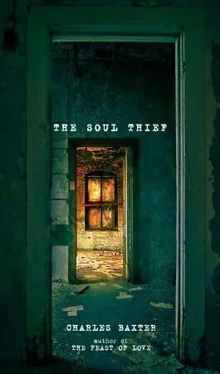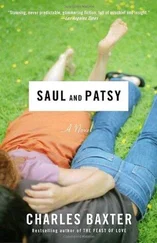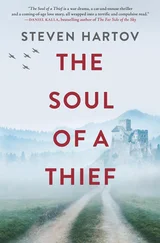Before he has been able to stretch or loosen up, she takes off. Theresa has gained the distance of a city block when he finally catches her. He’s reasonably fit and manages to overtake her without too much trouble, but when they reach a jogging path, she sprints ahead of him.
“So what’s your question?” she asks him, throwing the words to him, backwards, behind her.
“Those shirts?” he asks. “That burglar?”
“Him? Ben? You introduced us, remember?” Nathaniel remembers no such thing. “Anyway, I wanted to wear one of your shirts, to have you close to me. Really, Nathaniel, I do have moments like that.”
Nathaniel jogs around a hissing overfed goose, which lunges at him, and he tries to coordinate his pace with Theresa’s. But she has a habit of changing her speed whenever he’s next to her. A bird seems to be flying alongside him, and one of his familiars, a bag lady with a Band-Aid on her forehead caked with dried blood, stares at him fixedly from a bench. He runs off to the side to make way for another jogger, and when he does, Theresa slows down.
“I don’t think I believe you. I think you gave my clothes to Coolberg.”
“Why would I do that?” She falls in behind him. “Well, maybe I did do that.”
“Are you seeing him?” he asks, throwing off the words to the wind.
She says something that sounds like “ Seeing him? Of course I’m seeing him,” and Nathaniel would feign surprise and stop dead in his tracks, but he can’t pretend to be shocked — it would be insincere shock — and besides, he’s in no position to complain to her about anyone’s sexual duplicity. He’s not angry because he’s not jealous because he doesn’t love her. Also, she can’t see the expression on his face, so why bother? “And you,” she seems to say, from behind him. “You’re balling that dancer, that cabdriver.”
“How do you know?” he asks the wind.
“I followed you once,” the wind says to him, without inflection. “I looked in through the window at you two. She was performing for you. Scarves and shit. Very Isadora Duncan.”
This seems possible, so he drops the subject. Why isn’t she angry, if she took the trouble to be a voyeur? Maybe she just has a little curiosity about him, a shallow blank desire that lighted on him before it found its way into another corner, to another object, a suitable target for her brand of erotic whimsy. She is a kind of avant-garde lover, the type who will try anything without being truly invested in it. Voyeurism suits her perfectly; from where she watches, she occupies a zone of safety.
“Is Coolberg wearing my clothes right now?”
“Could be. He’s writing a story. He needs to be you for a while.”
“Oh, no.” He feels as if he’s been kicked in the stomach. He struggles for breath as he runs. At last he manages a question. “What’s the story about?”
Theresa catches up to him, jogs alongside him for a minute, then accelerates. Ahead of him, tossing up mud and dirt from her running shoes, she says, “He’s writing a book called Shadow. ” She’s panting slightly now from her exertions. “The first part is about a solar eclipse. The second section is set around the time of World War I and is about someone named Pierre Chadeau who’s followed around by his cousin, Henri l’Ombre, a ghost, who died on the front in Belgium. The third part takes place entirely at night. That’s the one with you in it.”
“What role do I play? What do I do?”
She slows down again, turning around, jogging backwards, facing him. She seems to have no fear of stumbling or running blindly, backwards, into anything. She raises her hands to her forehead and sticks her index fingers out toward him, as horns. “You’re the devil,” she says, grinning.
THE ZOO SHOULD HAVE BEENloud and smelly, with children milling around taunting the big cats for having been caught and caged, their kiddie-mockery accompanied by peanut shells launched toward the bars, and contemptuous laughter hurled at the now harmless teeth, the useless claws. There should have been trumpeting by unhappy elephants, desperate despairing silent roars sent up into the air by the voiceless imprisoned zebras, and there should have been peacock-shrieking.
But sometimes it happens that we enter a public place and find that, for once, the law of averages has broken down. We step gingerly into the darkened movie theater; the film starts, and we are the only ones in attendance, the only spectators to laugh or scream or yawn in the otherwise empty and silent rows of seats. We drive for miles and see no one coming in the other direction, the road for once being ours alone. Our high beams stay on. Where is everybody? The earth has been emptied except for us as we make our stuttering progress through the dark. We take each turn expecting that someone will appear out of nowhere to keep us company for a moment. In the doctor’s anteroom, no one else is waiting and fidgeting with nerves, and the receptionist has vanished; or we find ourselves alone in the fun-house at the seedy carnival, where, because of our solitude, there will be no fun no matter what we do; or we enter the restaurant where no one else is dining, though the candles have all been lit and the place settings have been nicely arranged. The waitstaff has collectively decamped to some other bistro even though they have left the lights on in this one. The water boiling in the kitchen sends up a cloud of steam. The maître d’ has abandoned his station; we can sit anywhere we please. The outward-bound commuter train starts, but no one else sits in the car, and no conductor ambles down the aisle to punch a hole in our ticket. In the drugstore no one is behind the cash register, and the druggist has left the prescription medications unmonitored on their assorted shelves. We enter the church for the funeral, and we are the first to arrive, and we must sit without the help of the ushers. Where are they? No sound, not a single note or a chord or a melody line from the organ loft, consoles and sustains us.
Such occasions are so rare that when they occur, we often think I don’t belong here, something is wrong or Why didn’t they inform me? or Let there be someone, anyone, else. But for the duration, when the law of averages no longer applies, we are the sole survivors, the only audience for what reality wishes to show us. This may be what the prophets once felt, this ultimate final aloneness.
So it was for Nathaniel and Theresa entering the Buffalo Zoo. “It looks like the maintenance hour,” she says, briefly jogging in place. “Nobody’s here.”
“Nobody’s here,” Nathaniel says, repeating her phrase, stating the obvious out of sheer surprise.
“And the cages are empty,” she says, pointing. Before them is a large zoological space defined by bars in front and walls on the side, and a small landscape near the back with a water trough, on which float a few haystraws. Where is the rightful inhabitant, the animal?
“Isn’t there a sign for what’s supposed to be in there?” he asks.
She looks up. “No.” She turns and with a thin smile seems about to say something. Then she touches her finger to her mouth and shakes her head twice. How complicated, and yet how simple, her inner dialogues must be.
Nathaniel pivots away from her and walks in a northward direction. Here are other cages, a few with identifying labels, and although some animals are on display, they are, one and all, sleeping. Here is Mika the Tiger, stretched out, eyes closed, possibly tranquilized. Over there is Gottfried the Panther — the name is affixed to the bars — also slumbering. Have all the animals here been given narcotics? He remembers a story about the Cumaen Sybil, who was granted a wish for eternal life but forgot to ask for eternal youth to accompany it, and who was immured in some sort of pen, where she grew older and older and smaller and smaller, until she was no larger than a spot of dust, crying out for death to deliver her.
Читать дальше












